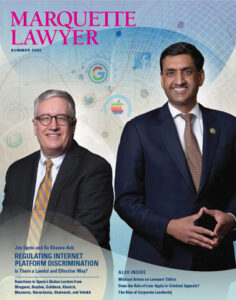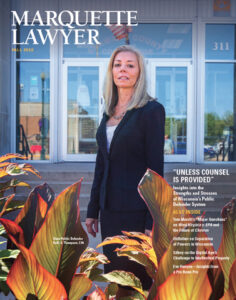Citations for “The Rise and Impact of Corporate Landlords”
The following post contains references for the studies and articles mentioned in “The Rise and Impact of Corporate Landlords,” which appeared in the Summer 2023 issue of the Marquette Lawyer magazine.
Bibliography
Demers, Andrew and Andrea L. Eisfeldt. “Total returns to single-family rentals.” Real Estate Economics 50 (2022): 7-32. https://doi.org/10.1111/1540-6229.12353
Desmond, Matthew and Nathan Wilmers. “Do the Poor Pay More for Housing? Exploitation, Profit, and Risk in Rental Markets.” American Journal of Sociology 124, no. 4 (January 2019): 1090-1124. https://doi.org/10.1086/701697
D’Lima, Walter and Paul Schultz. “Buy-to-Rent Investors and the Market for Single Family Homes.” The Journal of Real Estate Finance and Economics 64 (2022): 116-152. https://doi.org/10.1007/s11146-020-09790-5
Dorkin, Josh and Brandon Turner. Interview with Nazz Wang. BiggerPockets Real Estate Podcast no. 148. Podcast transcript. November 12, 2015. https://www.biggerpockets.com/bpp148-nazz-wang-podcast-transcript-zero-to-fifty-units-in-expensive-location
Epstein, Gerald A. “Introduction: Financialization and the World Economy.” In Financialization and the World Economy, ed. Gerald A Epstein, 3-16. Cheltenham: Edward Elgar Publishing, 2005.
Fields, Desiree. “Automated landlord: Digital technologies and post-crisis financial accumulation.” Environment and Planning A: Economy and Space 54, no. 1 (2022): 160-181. https://doi.org/10.1177/0308518X19846514
Gomory, Henry. “The Social and Institutional Contexts Underlying Landlords’ Eviction Practices.” Social Forces 100, no. 4 (June 2022): 1774-1805. https://doi.org/10.1093/sf/soab063
Leung, Lillian, Peter Hepburn, and Matthew Desmond. “Serial Eviction Filing: Civil Courts, Property Management, and the Threat of Displacement.” Social Forces 100, no. 1 (September 2021): 316-344. https://doi.org/10.1093/sf/soaa089
Raymond, Elora Lee, Richard Duckworth, Benjamin Miller, Michael Lucas, and Shiraj Pokharel. “From Foreclosure to Eviction: Housing Insecurity in Corporate-Owned Single-Family Rentals.” Cityscape 20, no. 4 (2018): 159-188. https://www.jstor.org/stable/10.2307/26524878
Saunders, Pete. “On NIMYs, YIMBYs and PHIMBYs.” Corner Side Yard (blog). February 10, 2023. https://cornersideyard.blogspot.com/2023/02/on-nimbys-yimbys-and-phimbys.html
Shelbourne, Talis. “Neighborhoods are being bought up by out-of-state investors with little to no interest beyond making money.” Milwaukee Journal Sentinel. November 10, 2022. https://www.jsonline.com/story/news/local/milwaukee/2022/11/10/out-of-state-investors-keep-buying-milwaukees-rental-homes-why/10461394002/
Spivak, Cary. “Out-of-state corporate landlords are gobbling up Milwaukee homes to rent out, and it’s changing the fabric of some neighborhoods.” Milwaukee Journal Sentinel. April 15, 2021. https://www.jsonline.com/in-depth/news/2021/04/15/milwaukee-rentals-overtaken-corporate-landlords-raking-profits/6989234002/
Vogell, Heather. “Rent Going Up? One Company’s Algorithm Could Be Why.” ProPublica. October 15, 2022. https://www.propublica.org/article/yieldstar-rent-increase-realpage-rent

 Nearly everybody uses the internet every day and, for many us, all day long. It is ubiquitous and, looked at from a long-term perspective, an amazing part of our lives. It is also far from perfect. Can it be made better?
Nearly everybody uses the internet every day and, for many us, all day long. It is ubiquitous and, looked at from a long-term perspective, an amazing part of our lives. It is also far from perfect. Can it be made better? It is nearly 60 years since the Supreme Court of the United States unanimously held, in Gideon v. Wainwright (1963), that individuals facing criminal charges are constitutionally entitled to representation by lawyers. And it has been just over 20 years since the death of Marquette Law School Dean Howard B. Eisenberg, who, early in his career, was a central figure in Wisconsin’s effort to comply with Gideon—in designing the state’s system for providing publicly funded representation for defendants unable to afford an attorney.
It is nearly 60 years since the Supreme Court of the United States unanimously held, in Gideon v. Wainwright (1963), that individuals facing criminal charges are constitutionally entitled to representation by lawyers. And it has been just over 20 years since the death of Marquette Law School Dean Howard B. Eisenberg, who, early in his career, was a central figure in Wisconsin’s effort to comply with Gideon—in designing the state’s system for providing publicly funded representation for defendants unable to afford an attorney.